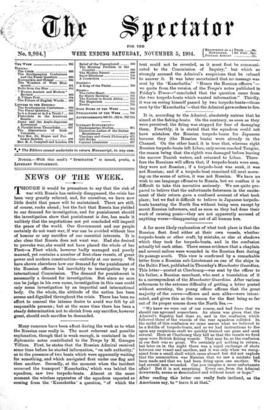and several sailors were wounded in the Russian fleet during
its passage south. This view is confirmed by a remarkable letter from a Russian sub-Lieutenant on one of the ships in the Baltic Fleet, published in Thursday's Manchester Guardian. This letter—posted at Cherbourg—was sent by the officer to his father, a Russian merchant, who sent a translation of it to a correspondent of the Manchester Guardian. After various references to the extreme difficulty of getting a letter posted without scrutiny, the young officer affirms that the great majority of the crews—officers and men alike—were intoxi- cated, and gives this as the reason for the fleet being so far out of its proper course down the North Sea :—
" We knew we were out of our course, and had fears that we should run aground somewhere. An alarm was given that the Admiral's flagship had done so, and in the confusion which followed three of the vessels of the rear squadron collided. In the midst of this confusion we came across what we believed to be a flotilla of torpedo-boats, and as we had instructions to fire upon any suspicious craft we quickly trained our guns and sank several. Here at Cherbourg they tell us that the vessels we fired upon were British fishing vessels. That may be, as the confusion in our fleet was so great. We certainly got nothing in return; but later on in the night there was a rapid exchange of shots between our vessel and another, and it was only when we recog- nised from a small shell which came aboard but did not explode that the ammunition was Russian that we saw a mistake had been made and that we had been firing upon one another. We had several men wounded. Can you imagine a more unfortunate affair? But it is not surprising. Every one, from the Admiral downwards, seems so demoralised and without heart or hope."
After reading this letter one really feels inclined, as the Americans say, to "leave it at that,"


























































 Previous page
Previous page